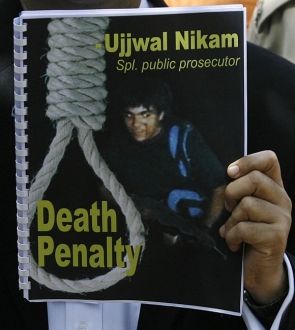 Five years after his arrest during the 26/11 strike on Mumbai and over a year after he was hanged to death after a much-publicised trial, Lashkar-e-Tayiba terrorist Ajmal Kasab continues to inspire myriad conspiracy theories.
Five years after his arrest during the 26/11 strike on Mumbai and over a year after he was hanged to death after a much-publicised trial, Lashkar-e-Tayiba terrorist Ajmal Kasab continues to inspire myriad conspiracy theories.
The latest one -- put in circulation by some Pakistani media organisations -- states, rather outrageously, that Kasab was arrested in Nepal in 2006. He was later handed over to Indian agencies and made a scapegoat in the 26/11 terror attack, claim certain Pakistani media reports.
The issue had come up in 2008 when one C M Farooque, a Pakistani advocate, claimed that Kasab was arrested in Kathmandu in 2006. Farooque even filed an application with the Nepal government, purportedly for Pakistan’s ‘public interest’, claiming that his ‘sources’ had informed him about Kasab’s arrest from Nepal.
Kasab was arrested along with nearly 200 people, Farooque had claimed, adding that the Nepal government possessed the relevant arrest documents.
An official of the Intelligence Bureau, who was closely associated with the 26/11 probe, believes that this is merely a diversionary tactic.
“There is enough evidence to prove that Kasab was in Mumbai that night. At no point during the trial did Kasab claim that he was arrested from Nepal,” said the official.
While Islamabad has admitted that Kasab is a Pakistani national, the Nepal government has rubbished any claims about the terrorist being arrested there.
“As per our phone records, the calls between the handlers in Pakistan and the two terrorists in the Chabad House put the Pakistan theory to rest. (Lashkare-Tayiba operative) Abu Jundal also confirmed that Kasab had been arrested during the 26/11 siege and his handlers had subsequently plotted several futile plans to free him,” said an official of the Mumbai crime branch, whose custody the terrorist was lodged in immediately after his arrest.
Lashkar operative David Headley, who planned a major part of the operation, has also admitted to the National Investigation Agency officials that the terror outfit was worried about Kasab’s arrest as he was capable of establishing the direct link of the Pakistan establishment with the Mumbai attack.
Lashkar handlers had even ordered the terrorists -- who were holding a Rabbi and his wife hostage at Chabad House in Nariman Point in south Mumbai -- to negotiate with Indian security agencies to secure the release of Kasab.
The negotiations purportedly failed and Rabbi Gavriel Holtzberg and his pregnant wife Rivka were brutally killed by the terrorists.
India has shared this and much more information with Pakistan. When a Pakistani judicial committee visited India in connection with the 26/11 probe, they were told in detail about Kasab’s arrest and subsequent trial.
Pakistani investigators have pointed out that they never got access to Kasab.
Interestingly, when Indian agencies had offered Pakistan a chance to send its officials and question Kasab, Islamabad had retorted that the Lahskar terrorist was not even a Pakistani citizen!
India could not possibly have granted access to Kasab after he was put on death row, nearly four years after the attack, when Pakistan finally got around to admitting that he was one of their own.
India also questions the double standard practised by Pakistan, which has denied New Delhi’s repeated requests to question 26/11 terror strike accused Hafiz Saeed and Zaki-ur-Rehman Lakhvi.
In fact, a Pakistan new channel had even traced Kasab’s family to Faridkot, despite best efforts by Pakistani security agencies to scuttle the story.
The Nepal government has also clarified that while several Pakistani nationals were arrested for not possessing proper documents, it had no record whatsoever of arresting someone like Kasab.









 © 2025
© 2025